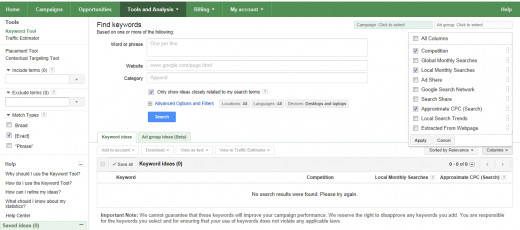Keyword Research Tips and Techniques
Simple and Easy
When I was first starting out with online writing, I tried to learn as much as I could about Search Engine Optimization (SEO) and keyword research. Everything I read was so long and confusing. I was exhausted by the time I finished reading and learning. My goal here is to give beginners a truly easy and simple, streamlined approach to keyword research. I don't believe, as a beginner, you really need all the extra "fluff" about keyword research. Beginners simply want to know how to do it, not why, where, when or what. This is a true beginner's guide to keyword research and is also the method I use after all of my research of the different methods.
What is a Keyword and why Does it Matter?
A keyword is what Internet users are typing into a search engine to find what they are looking for. Keywords are important to those of us who write Internet articles because no one will ever find us if we don't use keywords. Writing about things that people are searching for is the easiest way to get people to read your writing.
Begin Your Keyword Research
Go to the Google Keyword Planner This is the keyword research tool I use because it's free and easy to use. There are plenty of others to choose from but Google is just fine for beginners.
On the left side, where it says "Match Types", you want to check "exact".
In about the middle of the screen, you will see a check box and the text "Only shows ideas closely related to my search terms". You will want to make sure that this box is checked.
Towards the bottom left of the screen when you are at the top of the site will be a button the says "columns". Click this, and check the boxes for "Competition", "Local Monthly Searches" and "Approximate CPC". These are the only things that you really need to worry about in the beginning.

Find General Keyword Ideas
- Type your potential keyword or the article title you are thinking of using, into the field that says "word or phrase" and click "search".
- Click on the column "Local Monthly Searches" so it shows the highest first.
- Look through the keywords listed and decide on the ones that you know a lot about. You will want to choose one with a higher number of searches and a competition level of "low".
- Most places, I have read, say that you want to look for keywords with between 500 and 40,000 monthly searches. Anything more will probably mean that the Internet is already saturated with articles on that keyword.
Compare the Possible Income of Keywords
During your keywords research and before you actually choose your keywords, you will want to compare the possible income from each of your keyword ideas. Some keyword may have a very high search rate but they are very cheap keywords. You, ideally want highly searched, less competitive, and highly paid keywords.
According the Court and Mark at The Keyword Academy, there is actually a formula you can use to determine the Google Adsense income potential of your keywords. Since this is a beginners guide, I'm not going the explain the meaning behind the numbers but if you are interested in is included in The Keyword Academy's free E-book.
Income Potential = (Monthly Searches*0.2)*(CPC*0.25)*0.05
Example:
Income Potential of "Soccer"=(673,000*0.2)*(0.67*0.25)*0.05
=134,600*0.1675*0.05
=$1,127.275 Monthly Google Adsense Income Potential
If you do this with each of the keywords you are thinking about using, you can determine with ones are more profitable.
Narrow Keyword Ideas Down
Use the Income Potential calculations to decide on the most profitable keywords on your list. Decide on one specific keyword that will be your main one. Now, go back through the process you did to find your general keyword ideas but use the keyword or phrase you chose as your main keyword.
Pick Your Keywords
Look through the results and find keywords that are worth pursuing that are related to your main keyword. Choose 5 of the best keywords.
Research Your Competition for Your Keywords
Go to your favorite search engine and type in the different keywords you have picked. Read through the first few search results. Check how long the articles are and the different topics they have covered. You want to make your article better than the first article that shows up in the search engine results. Looking at other articles that rank high in google for your keyword will also give you an idea of the sub-topics to be sure you cover. However, do not copy or use any information you find on these sites unless you reference the site.
Make an Outline Using Your Keywords
You should have picked one main keyword that your entire article is about. You also should have picked about 5 supporting keywords that you also discuss under the topic of your main keyword. Your supporting keywords will typically become your articles' subtopics.
Write Content Around Your Keywords
Make sure that your main keyword is in the title of your blog post, HubPages article or whatever writing platform you use. You will also want to include it in your URL or domain name. Make sure your title isn't just your keyword. Your title needs to tell the reader exactly what your writing is about with your main keyword included.
Check Your Keywords
After you have written something, give it some time to start showing results. If you see barely any traffic or the traffic you get are not from the keyword you intended to target, you need to look into this. I would give it a few months before changing anything just to be sure.
You can go back into the Google Keyword Tool and enter in the URL of the article you have written. This will show you what kind of keywords your article is actually covering. Make sure you still check the exact match and only closely related boxes. Try a new title with some of these keywords as long as you feel your content accurately covers the topic.
You can also use Goggle Webmaster Tools to find out what keywords are actually bringing visitors to your website. If these keywords are not adequately covered in your content, you may want to add in some new content to make sure the people who come to your site looking for certain information find it.








